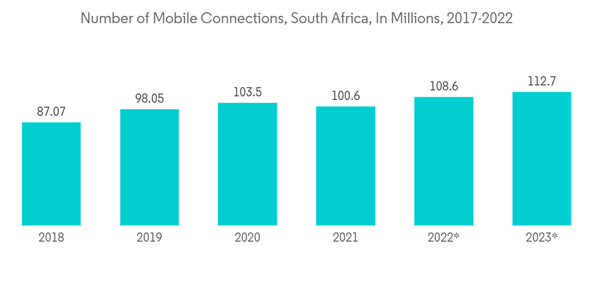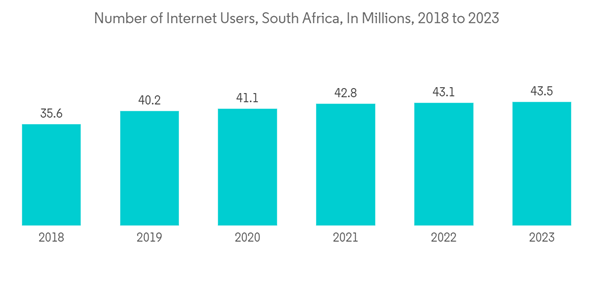Key Highlights
- Under Construction IT Load Capacity: The upcoming IT load capacity of the South Africa data center market is expected to reach 828.92 MW by 2029.
- Under Construction Raised Floor Space: The country's construction of raised floor area is expected to increase to 4.4 million sq. ft by 2029.
- Planned Racks: The country's total number of racks to be installed is expected to reach 220201 units by 2029. Johannesburg is expected to house the maximum number of racks by 2029.
- Planned Submarine Cables: There are close to 9 submarine cable systems connecting South Korea, and many are under construction. One such submarine cable that is estimated to start service in 2023 is Africa, which stretches over 45,000 Kilometers with landing points from Cape Town, Mtunzini, and Port Elizabeth in South Africa.
South Africa Data Center Server Market Trends
IT & Telecommunication Holds the Major Share
- The need for telecommunications services in South Africa has increased significantly during the last five years. Recently, the country's emphasis has been on fiber and LTE networks and backup capacity to increase and improve internet service connectivity. Telkom, one of the prominent telecom operators, anticipates shutting down its copper network in 2024 due to the ongoing transition to fiber.
- The country has recently made significant efforts to improve 5G legislation and regulations. One recent instance is the launch of a three-stage 5G spectrum auction by the Independent Communications Authority of South Africa (ICASA). South Africa's efforts to expedite spectrum auctions and new spectrum allocations would maximize the economic benefits of cellular technology in the country.
- The rapidly increasing 4G penetration and the upcoming 5G wave are motivating telecom vendors to invest in the South African data center market. In October 2022, the South African telecom provider Telkom established the 5G high-speed internet network with the help of Huawei Technologies from China. Huawei continues to assist South Africa in developing its 5G networks. The prominent 5G network on the African continent has more than 2,800 base stations deployed.
- In September 2022, the US Department of Commerce's Market Development Cooperator Program (MDCP), run by the International Trade Administration, awarded the Wireless Infrastructure Association (WIA) a grant for its proposed Roadmap to 5G success initiative. This project aims to accelerate the deployment of 5G in South Africa and boost business for US-based enterprises. South Africa has 109 million active mobile connections. Between 2021 and 2022, the share of individuals owning a mobile phone increased by 5%. Digital payments in South Africa are anticipated to grow from USD 14 billion to USD 25 billion during 2022-2027.
- Such developments, the growing population, and the ongoing demand for smartphones are, in turn, expected to boost the demand for data center market from the telecom segment leading to major demand for the servers during the forecast period.
Blade Servers To Grow At A Faster Pace In The Coming Years.
- Blade servers are a type of computer server that is designed for high-density computing and efficient use of rack space. These servers share a common chassis or enclosure, making them thinner and more compact. Space efficiency, modularity, reduced cable fragmentation, efficient cooling, centralized management, frequency availability, and energy efficiency are some of the main features and benefits of blade servers.
- Single or multiple server blades can be inserted or removed without distressing another running system. It reduces hardware costs, which is likely to entice industry players to adopt the technology, thereby fueling market growth. Additionally, each server blade does not consist of a distinct infrastructure and chassis, owing to which the product is relatively cheaper as compared to other solutions.
- To cater to end-user needs, the top companies are focusing on blade servers in data centers. The prominent companies that manufacture blade servers in South Africa include Dell (PowerEdge M Series), HPE (ProLiant BL Series), Cisco (UCS Blade Servers), and Lenovo (ThinkSystem Blade Servers), among others.
- The growing adoption of technologies such as cloud computing, artificial intelligence (AI), and IT services by businesses is propelling the use of servers in data centers. This sector is driven by the increased demand for streaming solutions and hyperscale data centers. Hyperscale computing, which is considered to be cost-effective in terms of enabling applications for large amounts of data, relies on the highly scalable server architecture and virtual networks that are becoming more and more popular.
- In the future, the growing Internet penetration and fiber connectivity will push the country digitally, which could propel South Africa's digital economy. For instance, In 2023, the country had 43.48 million Internet users and boasted a 72.3% Internet penetration rate in its population of 60.14 million. By 2024, South Africa aims to deliver universal Internet access in all its citizens' homes, further increasing the digital revolution.
South Africa Data Center Server Industry Overview
The upcoming DC construction projects in the country will increase the demand for data center servers in the coming years. The South Africa data center server market is moderately consolidated with a few major players, such as Dell Inc., Hewlett Packard Enterprise, Fujitsu, and Lenovo Group Limited. These major players, with a prominent market share, focus on expanding their regional customer base.In August 2023, Dell Inc. is transitioning its servers with Next-generation Dell PowerEdge Servers from OSA to ESA with PowerEdge R760 powered by 4th generation Intel Xeon Processors.
In January 2023, Cisco Systems Inc. announced the launch of the 7th generation of UCS C-Series and X-Series servers, powered by 4th generation Intel Xeon Scalable processors. With support for the latest Intel processors, Cisco has launched two new blades for the X-Series: the Cisco UCS X210c M7 Compute Node and the Cisco UCS X410c M7 Compute Node.
Additional Benefits:
- The market estimate (ME) sheet in Excel format
- 3 months of analyst support
This product will be delivered within 2 business days.










